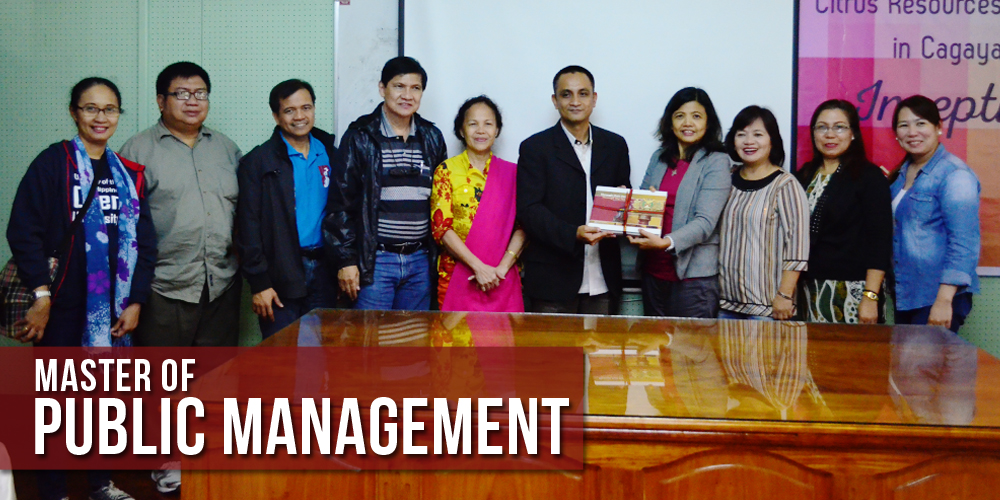
Master of Public Management
Program Description
The Master of Public Management (MPM) Program of the Faculty of Management and Development Studies, UP Open University (UPOU) was first offered during the second semester of AY 1997-1998. The institution of the Program was initiated and led by the then UP College of Public Administration (UPCPA, now the UP National College of Public Administration and Governance, or NCPAG), the country’s foremost academic institution in public management, education, research and extension.
The UPCPA, with the support of the Civil Service Commission, had aspired to assist in democratizing education by offering programs in distance mode. Distance education (DE) as an approach to learning aims to provide academic preparation to enhance the skills of practitioners who have no time to attend the University or cannot leave their work place due to tasks in the office or in the field. As such, the UPCPA took the challenge by offering DE programs. The College invited faculty from the UP System offering Public Administration courses as course writers and tutors, and ensured quality in the offering of programs.
Currently, the Program offers three specializations: Local Government and Regional Administration (LGRA), Public Policy and Program Administration (PPPA), and Voluntary Sector Management (VSM). The Program seeks to expand and develop other areas of specialization, such as Organization Studies, and Public Fiscal Administration, in the future.
Program Goals
The Master of Public Management (MPM) Program is designed for policy-makers, administrators, and managers of public, private, and non-governmental organizations; practitioners in local government and administration; and other individuals interested in good governance, and public policy and administration.
The fundamental goal of the MPM Program is to professionally upgrade the management skills and education of administrators and practitioners, in the pleasure of their own time and place.
- In particular, the program aims to: Provide a high level of competence in public policy, governance, and administration;
- Prepare students to become better public managers, administrators, government or volunteer workers and/or advocates of social change, administrative, reform, and national development; and
- Equip them with skills and knowledge needed in managing and developing organizations that work for the welfare and interest of the Filipino people.
Admission Requirements
Applicants to the MPM Program must have a bachelor’s degree or its equivalent from a recognized institution, and at least two years’ work experience.
Those seeking admission must also take and pass the MPM Graduate Admission Test (MPM-GAT) which are usually administered twice a year.
Documents to be submitted include the following:
- Duly accomplished application form for admission. If the applicant is a former UP student, he/she must indicate his/her student number in the form.
- Official Transcript of Records (1 original and 1 photocopy) bearing the school dry seal and imprint, and the Registrar’s signature in ink, and with acceptable remarks.
- Two letters of recommendation from: employer/ supervisor, former professor, former program adviser (the UPOU Form 1a to be used for this purpose is attached to the printed application form or can be downloaded online from the UPOU website).
- Two identical 2”x2” photos and two identical 1”x1” photos, with your name and the program applied for printed at the back of the photos.
- A 500-word essay (refer to item #30 of the application for admission form)
Mode of Instruction
All courses are delivered in Distance Education (DE) mode using state-of-the-art multi-media technology and equipment. Teachers and students interact via the internet mainly through the MOODLE (Modular Object-Oriented Dynamic Learning Environment) platform which can be viewed at the MyPortal LMS.
Courses
The MPM Program consists of a 36-unit academic course/program and a written comprehensive examination. The 36 academic courses include five mandatory core courses, i.e. these courses should all be taken by the students; two survey courses; three courses in the field of specialization; and two electives (from the pool of survey and field of specialization courses not yet taken by the student).
Specialization (9 units)
Program of Study
For admission related details, please visit UPOU website.
| Term | Number of Units Required |
|---|---|
| Graduate Admission Test (GAT) is required before admission to the MPM Program | |
1 st Semester
|
6 units |
2nd Semester
|
6 units |
3rd Semester
|
6 units |
4th Semester
|
6 units |
5 th Semester
|
6 units |
6th Semester
|
6 units |
| TOTAL NUMBER OF UNITS | 36 units |
| Comprehensive exam (student must have a GWA of 2.0 or better) | |
Program Policies
Students must complete 36 units with a General Weighted Average (GWA) of 2.0 or better.
Retention policy
The student must complete the MPM Program within seven years (UPOU Academic Information for Post Baccalaureate Programs by Distance Education, June 2000, page 14). Within the period, students must complete 36 units with a GWA of 2.0 or better. This qualifies them for the comprehensive examination.
Comprehensive Exam
The comprehensive exam is composed of two parts – the general field and the student’s area of specialization (Local Government and Regional Administration, Public Policy and Program Administration, Voluntary Sector Management). A student is given two chances to take and pass both fields. If the student fails to satisfy this requirement, he/she is permanently disqualified (PD) from the MPM Program.
The MPM student qualifies for graduation upon passing the comprehensive examination.
For admission related details, please visit UPOU website.

















FMDS Socials